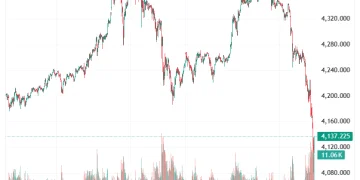Nigeria’s Fiscal Deficit May Hit 4.7% Of GDP In 2025 – IMF
Nigeria’s fiscal deficit is expected to rise to 4.7% of Gross Domestic Product (GDP) in 2025, according to the latest International Monetary Fund (IMF) report.
This projection signals persistent fiscal challenges despite the government’s continued reforms aimed at improving economic stability.
The projected rise in the deficit is largely attributed to the combination of reduced oil revenues and rising government expenditure, which could threaten Nigeria’s fiscal sustainability if not managed effectively.
According to the IMF report, “In the baseline, staff projects a consolidated fiscal deficit of 4.7 per cent of GDP in 2025. This is higher than the budget, owing to lower oil prices and production, and already reflects lower-than-budgeted capital expenditure.”
4.1% budget deficit recorded in 2024
In 2024, Nigeria managed to bring down its fiscal deficit to 4.1% of GDP, from 4.8% in 2023, largely due to stronger revenue collection, supported by exchange rate depreciation, inflation, and administrative efforts.
The report read, “The consolidated government deficit measured from below the line improved to 4.1 percent of GDP, from 4.8 percent of GDP in 2023.”
However, the country’s fiscal deficit for 2025 is projected to surpass initial budgetary expectations due to ongoing global oil price volatility and challenges in domestic revenue generation. The IMF staff report highlights that although Nigeria has made strides in increasing non-oil revenues through tax reforms, the oil sector’s performance continues to undermine fiscal stability.
The 2025 budget was based on optimistic assumptions regarding oil revenues, but with the recent downturn in oil prices and lower-than-expected production, the fiscal gap has widened. Consequently, the government’s ability to meet its budgetary targets has been compromised, especially as expenditure, particularly capital spending, is set to exceed the country’s fiscal capacity. With global economic conditions remaining unpredictable, the need for recalibrating fiscal policies is increasingly urgent.
Strengthening revenue mobilization to close the fiscal gap
The IMF’s baseline scenario indicates that Nigeria’s fiscal deficit will widen further in 2025, driven by lower oil revenues and anticipated underperformance in capital expenditure. To manage the fiscal deficit, the IMF recommends a neutral fiscal stance for the year, which would involve curbing non-essential spending while focusing on growth-enhancing investments.
A significant part of Nigeria’s fiscal strategy is hinged on fuel subsidy savings, which could contribute up to 2% of GDP in 2025, provided these savings are fully realized.
The IMF also suggests that the government intensify its domestic revenue mobilization efforts, especially through the full implementation of its ongoing tax reforms. The reforms to modernize the Value Added Tax (VAT) and Company Income Tax (CIT) systems are expected to improve tax compliance and expand the tax base, offering a sustainable solution to Nigeria’s fiscal challenges in the long term. However, these reforms will take time to produce significant results, and in the short term, the government must focus on curtailing unnecessary recurrent expenditures and rationalizing capital expenditures to safeguard fiscal stability.
The IMF further emphasizes the importance of a flexible and responsive policy framework to address both external shocks and domestic fiscal challenges. The government’s focus should be on fully realizing the savings from the fuel subsidy removal, accelerating tax reforms, and ensuring that critical infrastructure projects are funded without compromising fiscal stability.








